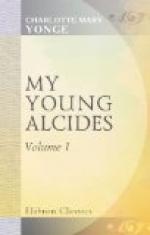But oh! that letter! Such a battery of heavy arguments against my unprecedented step in taking up my residence with these unfortunate young men, who, though they had not themselves openly transgressed the law of the land, yet were the offspring of unhallowed unions with the children of a felon. I cannot go through it all, but it hinted that besides their origin, there was some terrible stain on Harold, and that society could not admit them; so that if I persisted in casting in my lot with them, I should share the ban. Indeed, he would have thought my own good sense and love of decorum would have taught me that the abode of two such youths would be no fit place for the daughter of such respected parents, and there was a good deal more that I could not understand about interceding with his sister, and her overlooking my offence in consideration of my inexperience and impulsiveness.
On my first impulse I wrote to thank my old friend, but to say I could see no harm in an aunt’s being with her nephews, and that I was sure he had only to know them to lay aside all doubts of their being thorough gentlemen and associates for anybody. My little niece required my care, and I should stay and give it to her till some other arrangement was made. If Lady Diana were displeased with me, I was very sorry, but I could see no reason for it.
When I looked over the old Earl’s letter, before closing mine, some expressions wound out of the mist that made me uncomfortable, especially when I recollected that though it was a week since their arrival, no one had attempted to call but Mr. Crosse, the vicar of Mycening, a very “good man in the pulpit,” as the servants said, and active in the parish, but underbred and no companion.
Our neighbourhood was what is called very clannish. There were two families, the Horsmans and the Stympsons, who seemed to make up all the society. The sons either had the good livings, or had retired from their professions into cottages round and about, and the first question after any party was, how many of each. The outsiders, not decidedly of inferior rank, were almost driven into making a little clique—if so it might be called—of their own, and hanging together the more closely. Lord Erymanth of course predominated; but he was a widower of many years’ standing, and his heir lived in a distant county. His sister, Lady Diana, had been married to an Irish Mr. Tracy, who had been murdered after a few years by his tenants, upon which she had come with her three children to live at Arked House. I never could guess how she came to marry an Irish landlord, and I always thought she must have exasperated his people. She was viewed as the perfection of a Lady Bountiful and pattern of excellence; but, I confess, that I always thought of her when I heard of the devout and honourable women who were stirred up against St. Paul. She was a person who was




